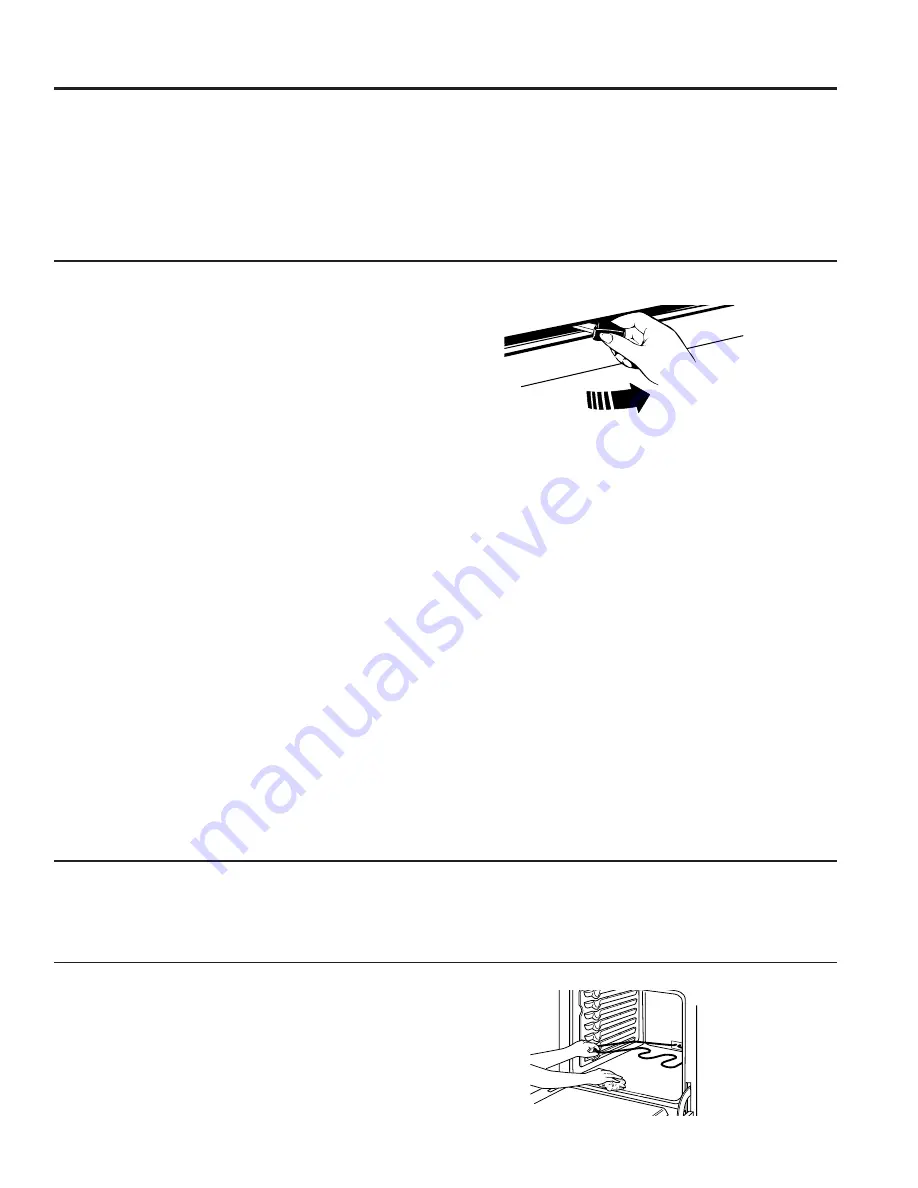
49-2001027 Rev. 2
21
Cleaning The Oven - Interior
CARE AND CLEANING:
Cleaning The Oven - Interior
The interior of your new oven can be cleaned manually or by using Self Clean.
Spillage of marinades, fruit juices, tomato sauces and basting liquids containing acids may cause discoloration and
should be wiped up immediately. Let hot surfaces cool, then clean and rinse.
Manual Cleaning
Do not use oven cleaners, abrasive cleaners, strong
liquid cleansers, steel wool, scouring pads, or cleaning
powders on the interior of the oven. Clean with a mild
soap and water or vinegar and water solution. Rinse with
clean water and dry with a soft cloth. When cleaning
surfaces, make sure that they are at room temperature.
Self Clean Mode (on some models)
Read Self-Cleaning Oven Safety Instructions at the
beginning of this manual before using Self Clean Mode.
Self clean uses very high temperatures to clean the oven
interior. You will need to lock the oven door when using
this feature. Before operating the self-clean cycle, wipe
up grease and soils from the oven. Remove all items from
the oven other than enameled (dark color) racks. Shiny or
silver racks and any cookware or other items should all be
removed from the oven before initiating a self-clean cycle.
Close the door. Latch the door.
NOTE:
Never force the latch. If the oven is too hot, you
will not be able to slide the latch. Allow the oven to cool.
If your range has a knob turn knob to self clean position
or if your range has an oven control press the
Self Clean
pad and a default self-clean time is displayed. The clean
time can be changed to any time between 3:00 and 5:00
hours by using the
+
/
-
pads to enter a different time and
pressing
Start
. For heavily soiled ovens, the maximum
5 hour clean time is recommended. If you wish to use
the default time, press the
Start
pad immediately after
pressing the
Self Clean
pad. The oven will turn off
automatically when the self-clean cycle is complete and
the self-clean light will be off. Slide the latch handle to the
left as far is it will go and open the door. Never force the
latch handle. Forcing the handle will damage the door lock
mechanism. After the oven has cooled down wipe any ash
out of the oven.
We recommend venting your kitchen with an open
window or using a ventilation fan or hood during the first
self-clean cycle.
Soil on the front frame of the range and outside the
gasket on the door will need to be cleaned by hand.
Clean these areas with hot water, soap-filled steel-wool
pads or cleansers such as Soft Scrub
®
. Rinse well with
clean water and dry.
Do not clean the gasket. The fiberglass material of
the oven door gasket cannot withstand abrasion. It is
essential for the gasket to remain intact. If you notice it
becoming worn or frayed, replace it.
Make sure the oven light bulb cover is in place and the
oven light is off.
IMPORTANT:
The health of some birds is extremely
sensitive to the fumes given off during the self-cleaning
cycle of any range. Move birds to another well-
ventilated room.
To Stop a Self-Clean Cycle
Press
Cancel/Off
and wait for self clean light to go
off. Wait until the oven has cooled below the locking
temperature to unlatch the door. You will not be able to
open the door right away unless the oven has cooled
below the locking temperature.
Racks
All racks can be washed with warm, soapy water.
Racks may be more difficult to slide, especially after
a self-clean. Put some vegetable oil on a soft cloth or
paper towel and rub onto the left and right edges.
Oven Heating Elements
Do not clean the bake element or the broil element. Any
soil will burn off when the elements are heated.
To clean the oven floor, gently lift the bake element.
Clean the oven floor with warm, soapy water.
Gently lift the bake element












































